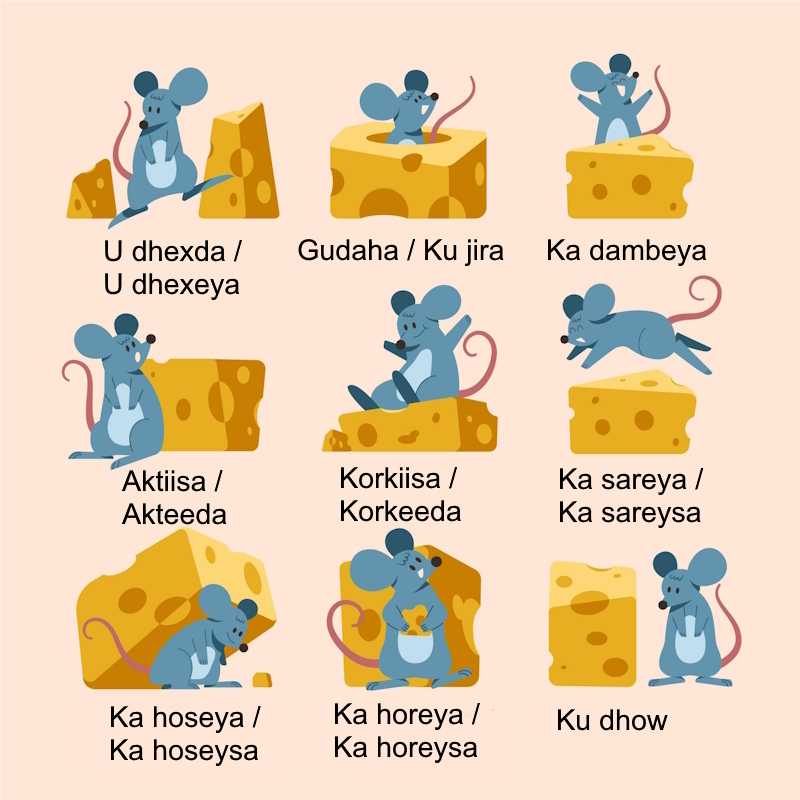 | Chapter 46 - Words of Positions |
|---|
 |
 |
|---|
Generalities:
The function of these words is equivalent to that of an adverb of place, for example: on the table, near the door, under the tree.
In the Somali language they can also be different parts of speech as given below:
1. VERBAL PREFIXES:
They give the location or position of a person or object, and they stand before the verb.
Examples:
Ninku guriga buu hor joogaa. = the man is in front of the house.
Buuggu miiska buu dul yaal. = the book is on the table.
Iyedu albaabka bay ag fadhida. = she is sitting near the door.
NEGATIVES: The verbal prefixes remain in position in front of the verb and the “ma” negative comes before it.
Examples:
Ma hor joogo. = he is not in front
Ma dul yaallo. = it is not on (the table).
Ma ag fadhido. = I'm not sitting next to you.
2. NOUNS:
They take a Masculine or Feminine definite article suffix, and perform the function of adverbs of place.
| Noun | Noun + masc. poss | Noun + fem. poss | Translation |
|---|---|---|---|
| ag [-ta] | agtiisa | agteeda | = near |
| dabo [-a] | dabadiisa | dabadeeda | = back, behind |
| dhex [-da] | dhexdiisa | dhexdeeda | = between, in the middle |
| dabad [-da] | dabaddiisa | dabaddeeda | = behind |
| debed [-da] | debeddiisa | debeddeeda | = exterior, outside |
| dul [-/sha] | dushiisa | dusheeda | = top, on top of |
| gees [-ka] | geestiisa | geesteeda | = side, beside |
| gudo [-/aha] | gudahiisa | gudaheeda | = interior, inside of |
| hareera [-ha] | hareerahiisa | hareeraheeda | = around |
| kor [-ka] | korkiisa | korkeeda | = top, on top of |
| hoos [-ta] | hoostiisa | hoosteeda | = bottom, under |
| hor [-ta] | hortiisa | horteeda | = front, in front of |
Examples:
Xagguu fadhiyaa? - Dhexda buu fadhiyaa. = Where is he sitting? - He’s sitting in the middle.
Magacaaga dusha / korka ku qor. = Write your name on the top.
3. NOUN + POSSESSIVE ADJECTIVES:
Ninku guriga hortiisa buu joogaa. = The man is in front of the house.
Buuggu miiska dushiisa buu yaal. = The book is on top of the table.
When we add the Possessive Adjective (-iisa, -eeda, -ooda, etc.) to the noun suffix, the singular suffix has to agree with the gender of the person or thing which is the possessor; and all of them have to agree in number.
Examples:
Guriga hortiisa buu joogaa. = He is in front of the house (Masculine).
Shalemada horteeda buu joogaa. = He is in front of the cinema (Feminine).
miiska korkiisa = on top of the table.
sariirta hoosteeda = under the bed.
aqalka geestiisa = beside the house.
xerada hareeraheeda = around the enclosure.
beledka sookadiisa = this side of the town.
webiga shishadiisa = beyond the river.
qolka gudaha = inside the room.
ninkaas beddelkiisa = in place of that man.
dadka dhexdiisa = in the midst of the people.
boqorka hortiisa = in front of the king.
sanduuqa agtiisa = near the box.
dibiga dabadkiisa = behind the ox.
baabuurka gadaashiisa = the back of the truck.
4. VERBS:
Verbs are also formed from some of these nouns.
Examples:
Sagaal baa toban ka horeeya. = Nine comes before ten.
Garissa baa u dhexaysa Nayroobi iyo Waajir. = Garissa is between Nairobi and Wajir
5. MISCELLANEOUS EXPRESSIONS:
Examples:
Markii hore / Bishii hore = last month
Horaynta = the beginning
Horumarka = the progress
Anigaa ugu soo horeeyey. = I came first.
Xamar hore buu u yimid. = He has been to Mogadishu before.
Ka hor jeeda = opposite
Hore u soco = go straight ahead
| Preceding Chapter | Next Chapter | Table of Contents |
|---|